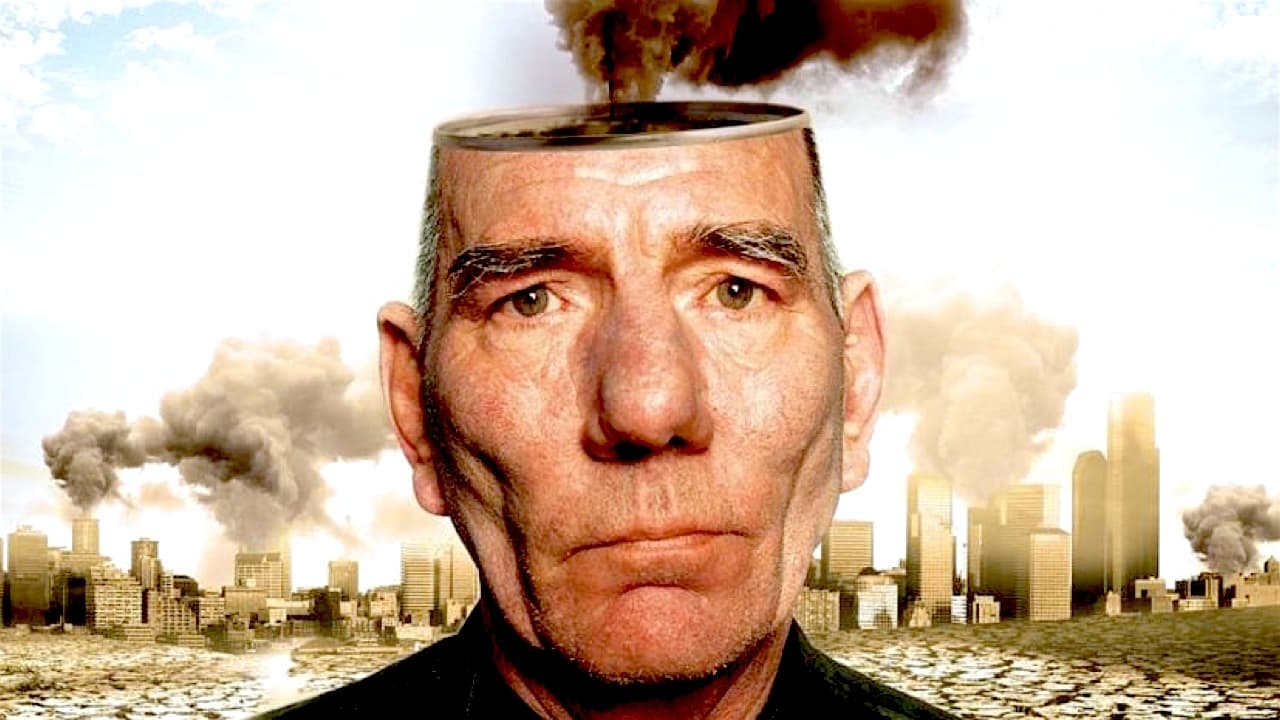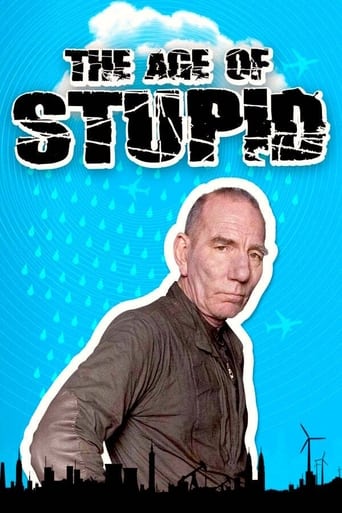

It's a documentary about global warming or, more specifically, about anthropogenic global warming. Our host and narrator is a very serious Pete Postlethwaite. The opening shows us scenes, most computer-generated images, of a Las Vegas buried under sand dunes and a Sidney Opera House burning amidst the rubble. The message, repeated several times, is, "We could have saved ourselves." The producers are more certain about that than I am. The question is not whether the earth is heating up -- of course it is -- but how much our own activities contribute to that warming. If we ceased all emission of greenhouse gases at once, could we really "save ourselves"? The answer can't be a simple "yes" because we don't know for sure. The only correct answer is "probably" -- with a high degree of probability, and probably very high.However, my judgment is based on a scientific approach to social problems, a filthy tendency I picked up during a career in research. But this unnerving documentary isn't aimed at people like myself, who take science seriously. It's aimed at an audience who either haven't thought much about the ultimate effects of global warming or have managed to convince themselves -- or to let others convince them -- that the whole issue is a liberal-inspired hoax with Al Gore at the bottom of everything. That's almost as sad as the message of the film. The people who need most to see it will never watch it because it challenges an ideology to which they've committed themselves.The first example is presented by an eighty-two year old French guide to climbing in the Alps. He begins by leading a married couple down what appears to be a quarter mile of ladders bolted to a cliff face of rock, and he remarks that when he began his career there were no ladders because climbers could step directly off the cliff onto the glacier. Since then, the glacier has melted and dropped hundreds of feet. I didn't need convincing. I climbed, or rather walked, on the Columbia Icefield in Alberta, Canada, for the first time in 1953. I visited it again in 1988 and the edge of the ice had retreated about the length of a football field, one hundred yards or so, the glacier having melted to that extent over a mere 35 years.It's an important film but not a perfect one. The producers sort of skipped over the root cause of the processes they condemn. Regrettably, we can reduce our greenhouse gas emissions all we want, but there really is only one sure and final way to cut our contribution to global warming. As long as human being make use of an energy source there will be some environmental impact, large or small. Eventually we'll need to face the fact that there are simply too many of us. Nobody has exact figures on the world's population but the best estimate is that in 1950 there were about two billion of us. Today there are somewhat more than six billion. And, at current growth rates, by 2050 we should have doubled that figure to twelve billion. Every one of those twelve billion will be a contaminant, and China is the only nation currently addressing the problem -- in its own interest, not that of the globe. We all need a long-distance wake-up call from Thomas Malthus.And what is America doing? We're electing politicians who decry all science that doesn't fit their ideology, not just global warming but evolution. (Other countries have done such things before, proving the superiority of the Aryan race and the fact that acquired traits are inherited.) Two years ago, an elected representative stood on the floor of Congress, railing against the global warming hoax, took a deep breath, blew it out, and said, "That's carbon dioxide. See? It's not a poison gas!" A Missouri Congressman, a member of the House Science and Technology Committee, who believes that a woman can't conceived after being raped, recently told us, "I'm not anti-science. I'm pro-science. Only let's have science we can believe in." "The Age of Stupid." Even if everything else about the film were wrong, they'd have gotten the title right.
... View MoreAn appropriate title for a documentary in the genre of An Inconvenient Truth, minus the robot like Al Gore. Instead the narrator is Pete Postlethwaite, a dryly funny British actor who leads us through our insane self destruction. It is 2055, and Pete watches news clips of the past, in which the human race did little to prevent climate change. Through flashbacks to teal events, such as Hurricane Katrina, with with an interview with a survivor who stayed to help, in spite of the fact that he lost everything, Al Duvernay, and others show the real cost of our stupidity.London is under water and Sydney is on fire; Las Vegas is a barren wasteland, and the Amazon rain forest is gone. We have almost completely destroyed the planet. Piers Guy tries to make a difference by developing wind farms, a clean and renewable energy source. He battles residents of an English town who complain that the turbines will spoil their landscape. Not in my backyard, as the saying goes. It is our selfishness that will ultimately wipe us out. Other people from around the world are interviewed who still haven't yet given up; but by the end of the film I personally believe that we are at a point of no return. We just cannot continue to add to a world population of over seven billion and survive. Nevertheless, The Age of Stupid is a fine effort.
... View MoreThe subject of climate change is often covered but rarely brought to the big screen. This ambitious low budget project is well worth viewing because it will make you think just that little more about how we're draining resources on earth.It's a neat idea. The late and much missed Pete Postlethwaite is an archivist who spends the entire film touching a computer screen showing us reasons why the planet ended up in such a desolate state in 2055.Interlaced with six separate documentary stories covering various aspects of climate change are snippets of news recordings, social commentary and animation hybrid. It all works rather well, your interest is kept high and the stories all work the grey matter into overdrive. All held together by Postlethwaite who in reality has very little to do but does it rather well nonetheless. Most certainly worth a watch and just may well tempt you to try reduce your carbon emission. A good effort all round.
... View MoreI really enjoyed how this film approached the topic of climate change from many different angles. By comparing the lives of the different people featured in the film, one is able to see the variance that exists in how carbon use varies from one person to another. The Age of Stupid has a very interesting format. It is supposed to be a transmission that is recorded in the future as a sort of cautionary tale that was to be concealed in a time capsule that documents the the way that the human race eventually destroyed themselves as well as the rest of the world. It is a montage of actual footage from the news and other documentaries, sections that glimpse into the reality of real life characters documented, and commentary from the fictional character who is recording the "transmission."This was definitely a little out there in terms of format, but had a lot of important information that many people out in the world need to hear and take into consideration. The format may be a bit weird for some to warm up to, but if you can get past that, it is a touching documentary that inspires. In an age where a fairly large percentage of the population does not believe in man-influenced climate change, there's no shortage of stupidity. It's time for people to wake up and see if we can stop and maybe even reverse this damage we're doing to our home.
... View More